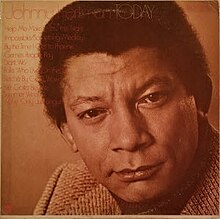
The Stylistics are an American, Philadelphia soul group that achieved their greatest chart success in the 1970s. They formed in 1968, with a lineup of singers Russell Thompkins Jr., Herb Murrell, Airrion Love, James Smith and James Dunn. All of their US hits were ballads characterized by the falsetto of Russell Thompkins Jr. and the production of Thom Bell. During the early 1970s, the group had twelve consecutive R&B top ten hits, including "Stop, Look, Listen", "You Are Everything", "Betcha by Golly, Wow", "I'm Stone in Love with You", "Break Up to Make Up" and "You Make Me Feel Brand New", which earned them 5 gold singles and 3 gold albums.

"Betcha by Golly, Wow" is a song written by Thom Bell and Linda Creed, originally titled "Keep Growing Strong" and recorded by Connie Stevens under the Bell label in 1970. Stevens' recording runs two minutes and thirty seconds. The composition later became a hit when it was released by the Philadelphia soul group the Stylistics in 1972 under its better known title, "Betcha by Golly, Wow".

John Maurice Hartman was an American jazz singer, known for his rich baritone voice and recordings of ballads. He sang and recorded with Earl Hines' and Dizzy Gillespie's big bands and with Erroll Garner. Hartman is best remembered for his collaboration in 1963 with saxophonist John Coltrane, John Coltrane and Johnny Hartman, a landmark album for both him and Coltrane.

John Coltrane and Johnny Hartman is a studio album by John Coltrane and Johnny Hartman which was released by Impulse! Records in July or August 1963. It was inducted into the Grammy Hall of Fame in 2013.
Flying High Together is an album by Smokey Robinson and the Miracles on Motown Records' Tamla label, released in 1972. It is noted as The Miracles' last studio album with original lead singer Smokey Robinson, who retired from the act to concentrate on his duties as Vice President of The Motown Record Corporation. The album charted at #46 on the Billboard Pop Album chart, and featured two singles: the appropriately named "We've Come Too Far to End It Now", which matched the parent album's chart position on the Billboard singles chart, charting at #46, and reached the Top 10 of the Billboard R&B singles chart, charting at #9, and "I Can't Stand to See You Cry", which charted at #45 Pop, and #21 R&B.
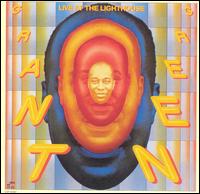
Live at The Lighthouse is a live album by American jazz guitarist Grant Green featuring a performance recorded at the Lighthouse Café in Hermosa Beach, California in 1972 and released on the Blue Note label.
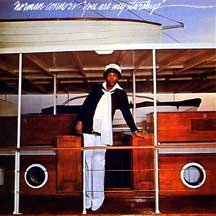
You Are My Starship is an album by the Philadelphia, Pennsylvania jazz drummer Norman Connors. Released in 1976 on Buddah Records, it featured bass player/vocalist Michael Henderson and Philadelphia vocalist Phyllis Hyman. The album reached number five on the US R&B chart and number one on the Jazz chart.

The First Time Ever (I Saw Your Face) is an album by American pop singer Johnny Mathis released on May 10, 1972, by Columbia Records and continues in the tradition set by his recent studio releases of covering mostly current chart hits. A trio of selections on side one ("Love Theme from 'The Godfather' (Speak Softly Love)", "Theme from 'Summer of 42' (The Summer Knows)", and "Brian's Song (The Hands of Time)") originated as film scores and had lyrics added later.

The Mathis Collection is a compilation album by American pop singer Johnny Mathis that was released in the UK in 1977 by CBS Records. The subtitle on the cover reads, "40 of my favorite songs", and a statement from Mathis in the liner notes says, "Songs are very personal things. On this double album I have attempted to put together a collection of those which are most meaningful for me. I hope they mean as much to you." The compilation includes six of the 12 songs that had reached the UK singles chart by the time of its release but focuses mainly on album tracks.

Songs from the Heart is a 1956 album by Jazz singer Johnny Hartman. It was Hartman's debut album and was released on the Bethlehem label. The album was reissued in 2000 with six additional tracks, alternate takes of songs from the original album.

All of Me: The Debonair Mr. Hartman is a 1957 album by Jazz singer Johnny Hartman. It was released on the Bethlehem label. The album was reissued in 2000 with four additional tracks, alternate takes of songs from the original album.
"There's a Lull in My Life" is a 1937 song, written by Mack Gordon and Harry Revel for the film Wake Up and Live. A "torch ballad", it was released in 1937 as a single and became Alice Faye's only major hit record. Other popular versions in 1937 were by Teddy Wilson, George Hall and His Orchestra, and by Duke Ellington.

Unforgettable Songs by Johnny Hartman is a studio album by American jazz vocalist Johnny Hartman, released in 1966 by ABC-Paramount Records. Gerald Wilson served as the arranger and conductor, and the album was produced by Bob Thiele.

I Love Everybody is a studio album by American jazz vocalist Johnny Hartman, released in 1967 by ABC Records. It was produced by Bob Thiele and features arrangements and conducting by Jack Pleis and Oliver Nelson.

And I Thought About You is a studio album by American jazz singer Johnny Hartman, released in 1959 by Roost Records. Teddy Reig, owner of Roost, served as producer, and Rudy Traylor did the arrangements. It was the only album Hartman managed to record between December 1956 and his session with John Coltrane in March 1963.

Johnny Hartman, Johnny Hartman is a studio album by American singer Johnny Hartman, released in 1977 by Musicor Records. Gene Novello produced the record and co-wrote all of the songs. Fred Norman served as arranger and conductor. The title of the album is a play on Mary Hartman, Mary Hartman, the satirical television series popular at the time.
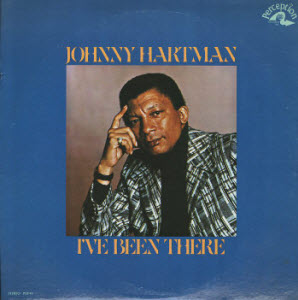
I've Been There is a studio album by American singer Johnny Hartman, released in 1973 by Perception Records. It was produced by Boo Frazier, and arranged and conducted by Tony Monte. Similar to his previous album – Today (1972) – Hartman includes several popular tunes by contemporary songwriters such as Paul Simon, Kris Kristofferson, and Antonio Carlos Jobim. Jazz musician Jimmy Heath is among the musicians on the album, performing on tenor saxophone and flute.

For Trane is a compilation album by American jazz vocalist Johnny Hartman that was released in 1995 by Blue Note Records. It contains material from two albums that Hartman recorded in Tokyo in 1972, Hartman Meets Hino and Hartman Sings Trane's Favorites. The original LPs were only available in Japan. For Trane marks the first time the songs have been released in the United States.
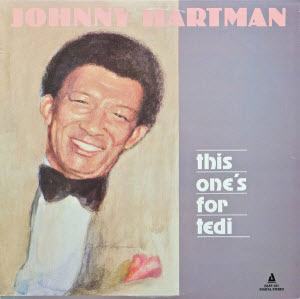
This One's for Tedi is a studio album by American jazz vocalist Johnny Hartman, released in 1985 by Audiophile Records. It was his final studio recording, made in August 1980, three years before his death. The album is dedicated to Hartman's wife Theodora (Tedi). According to producer George H. Buck Jr., This One's for Tedi "was the first digital recording to be made in Canada."
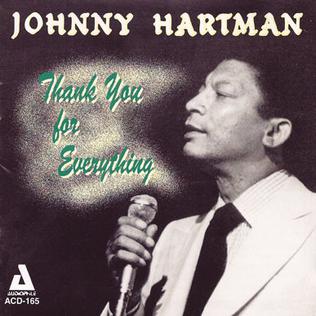
Thank You for Everything is a studio album by American jazz vocalist Johnny Hartman, released in 1998 by Audiophile Records. The material was originally recorded in mid-1976 for two episodes of Alec Wilder's National Public Radio series entitled American Popular Song. Each episode focused on one composer, and Hartman chose works by Billy Strayhorn and Cole Porter. Most of the songs from the two episodes are included on Thank You for Everything and marked the first time they had been commercially released.
